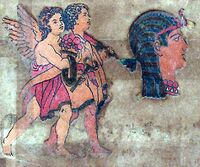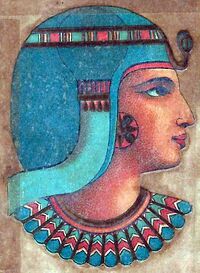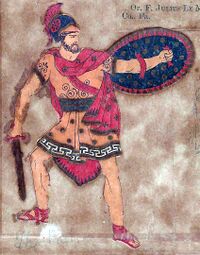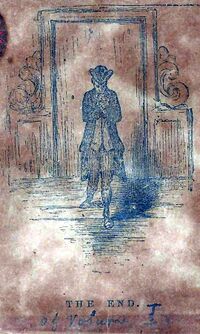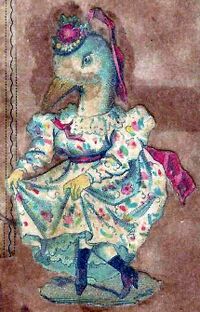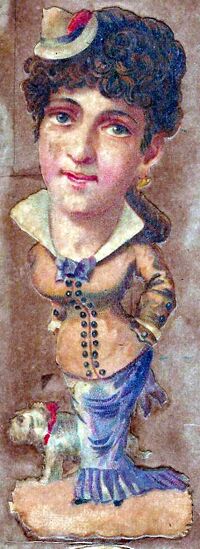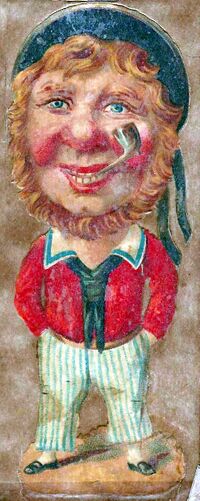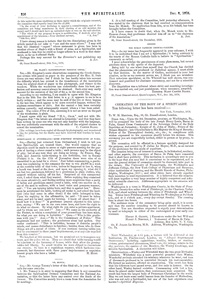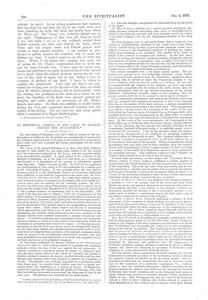The Past
|
< The "Double". Who are the Producers thereof? (continued from page 1-205) >are given through different media, and each doctrine thus given, whether true or untrue, is made a standpoint to prove other doctrines which are man-made. The doctrine or theory of a “double” is, in my humble, opinion, proved only by a false standpoint. For more than fifteen years I have been a full believer in the doctrine that “none but qualified angel missionaries are the producers of the spiritual phenomena,” and with a full understanding of this doctrine we have a key to unlock very many mysteries that are otherwise unsolvable. By this key it is determined that the double is produced by qualified, disembodied spirits, though the person of whom the double is a facsimile, may apparently will the production of the double; the volition may be and is a spiritual impression, in my humble opinion. Now, Mr. Editor, as I have broached a doctrine perchance antagonistic to long established views of your own, I desire to call your attention to an article in the Religio-Philosophical Journal of March 11th, 1876, on the first page, over the signature of E. D. Warren, and also the article of mine to which he refers in said journal of February 12th, 1876, headed Supernal Laws Governing Spiritual Phenomena. D. Gr. Mosher.
Mosherville, Hillsdale County, Michigan, U.S.A.
The Story of the Conversion to Spiritualism of a Scientific Inquirerexciting Manifestations at HomeSir,—I am say nearly forty years of age, and have studied classics and mathematics in the schools in earlier times; also chemistry and physics in the Royal College of Chemistry and elsewhere at a later period; I have attended countless lectures on scientific subjects in all branches; have read enough “hand-books,” “text books,” “manuals,” and “first principles” of all the “ologies” and “isms” to form a small library; have kept up in the latest discoveries by a diligent perusal of the scientific periodicals and magazines and “proceedings” of learned societies; have conversed with every first-class savant I have met with on his own particular subject; and am a M.R.I. Therefore I fancied I knew a thing or two, and had a firm and sure basis whereon to pile up future knowledge; was enfolded in threefold brass against Spiritualism especially, which, indeed, appeared demonstrably absurd, judged from the scientific side on the correlation of forces, and by the latest discoveries and experiments on brain and nervous function; and nearly all the great leaders in modem metaphysics and philosophy arrived at a similar result by pure reason and the inductive method. Protestant religious conviction or “bigotry,” and my surroundings generally, lent their aid in making the subject a disagreeable one in every way. Some years ago I accidentally received a copy of the Report of the Dialectical Society on Spiritualism, and glanced over it; could not believe much more than “self-deception.” “Some jugglery, no doubt,” and soon forgot all about it; this was my first “spiritual” reading. In The Quarterly Journal of Science for August 1st, 1871, I met with a paper on “Psychic Force,” by Mr. Crookes, very interesting; in the October 1st, 1871, a second paper, also by Mr. Crookes, on the same subject, still more surprising. Now, Mr. Crookes being a first-rate man and a tried observer, one felt disturbed, unless, indeed, Mr. Crookes was for once in his life mistaken or “cracked.” However, the impression again died away, until some two years after I saw Mr. Crookes’s book Facts in Spiritualism. I now resolved to read up somewhat about this disturber of peace, and settle him one way or the other. After reading some ten volumes of a very (to me) novel and astounding character, I resolved to try an experiment with two or three intimate friends in whom I had perfect confidence. We were soon racing round with a loo-table, which went this way and that, tilted, and so on, as requested, and answered questions by tilting. Our first word spelled out in reply to a request for the name of the intelligence was “Nemo,” and on request for some better cognomen, “Legion” was given. On our grumbling at this name—“Ask more serious questions,” which hint we took, and got intelligent replies to all our queries. Next day (Wednesday) a planchette was procured, and several curious results followed on the first trial, in which the close imitation of the handwriting of a deceased person was quite as remarkable as the words and sentences written out. Soon afterwards a second name was written out, and very clearly, that of a Mrs. — —, an old and much, esteemed friend recently deceased; then followed several long sentences appointing either of two mentioned days for “becoming visible,’’ this to take place “in that room (our drawing-room), and nowhere else,” and “through the help of a Mr. Williams a medium,” and “no other person to be present but four members of our own family.” I procured Mr. Williams’ address on the following day (Thursday), and arranged for a seance, to take place on the latter of the two days mentioned (viz., Saturday) at one p.m. Mr. Williams, three members of our own family, and myself, only to be present. We now put away the planchette for a little, and formed the same party, with one fresh hand, round the same loo-table, and after the usual racing and tilting, as requested, answers to various trivial questions were obtained with much vigour; then one of our party placed his hand for a few seconds on the planchette again, when an intricate figure was produced very rapidly. This proved to be a monogram, N. L.; now came a scarcely legible word like “darken.” No one of us could understand this; then came, very quickly and clearly written, “We will try to appear in the dark.” The room was made dark, when the table became very lively indeed, seemed to lose its weight, and began soon to rise, or float as it were. It went up until beyond the reach of all save the two tallest of party, and they had only the tips of their fingers on the upper surface of the top of the table. On its coming down after first elevation, some one said, “Can you make it heavier?” Yes. “Pray do so.” The weight now became so great that to move it without fracture seemed impossible. This alternate floating and “fixing” was repeated two or three times by request. Some one now said, “Can you rap answers? one for ‘yes,’ two for ‘no’?” In a second I heard my first rap, and a very peculiar and inimitable sound it is. Several questions were asked now, and answered by raps instead of by tilts as previously, such as, “Are you still trying to appear?” Yes. “Do you think you can do so to-night?” Yes. “In half-an-hour?” Yes. “Twenty minutes?” Doubtful (by three raps). Some one fancied a hand was now placed on him; others fancied that curious firefly-like lights, or sparks, began flitting about the room. A wooden music-stand, some eighteen feet distant from the table, was moved about and slightly broken; the table became again convulsed; the leg and cross-bar were broken off with loud splitting sounds. Some one now suggested that it was “getting very late” and as this sentiment appeared to be very generally held by all those present, we brought experiment two to a termination. On the following Saturday at one p.m., as arranged, Mr. Williams and three members of our own family and myself were present. Mr. Williams and the others sat down at once to a little round work-table, which I had chosen especially, because made of a plain solid slab of wood on a plain solid pillar of wood; no drawer. I had sent for two hand-bells at Mr. Williams’ request, and, until they came, had placed a larger (dinner) bell underneath an Erard piano, about fifteen feet away from where the party were seated. I was anxious to have all quite conclusive. Mr. Williams was put in his chair the instant he came in, and to my positive knowledge remained there throughout, his feet in contact with the other sitters on each side, and his fingers firmly held in contact with theirs. For my own part I remained purposely roving around the table generally, to prevent even the possibility of error, or losing sight of any phenomena which might occur. Well, in a few minutes the small work-table moved up freely, and, with delicate raps, stated that the appointment had been kept: “Mrs. M—was there;” whilst one or two questions for identity were put, and being answered, several vivid and beautiful lights flitted about the room. These were very like fireflys, but were larger and more beautiful in the colour of light. I now heard the large bell ringing gently, and approaching the table through the air. I also heard and felt it when placed on the centre of the table. At this moment the two hand-bells were brought by a servant to the door, tied up in paper and string, as just come from the shop. I placed them on the top of the piano, some twelve feet from the party at the table, and had scarcely done so, and retired a step or two, when I heard the tongue of the smaller of the two bells striking inside the paper covering. I returned instantly, and removed the paper and string from both bells; whilst doing so I felt a hand grasp my foot, and the next moment the smaller of the two bells, which I had just freed from its covering, and laid down again on the top of the piano, was seized before my eyes by a small luminous spot, or, more correctly, two patches of light, with the knob of the handle of the bell between them. On looking more closely one could see that one spot was the middle knuckle of a forefinger, and the other a thumb as far as end of first joint; the bell, ringing in a peculiarly joyous way, advanced through the air into the middle of the large room—then came to the table and went clear round the head of each of the party. I now closely watched the bell, by the light from before-mentioned spots, and marked that the ringing was caused by the tongue vibrating of its own proper motion, within the bell: which latter was sailing or floating in the air in an upright position, and quite free of all motion save this floating, gliding, onward motion; the bell made a wide circuit in the room again, then was drawn caressingly over the hands of several of the party, and lastly, was very gently laid down upon my hand. As it did so I felt the caress alluded to by the others, and saw the light vanish. Some one now said, “I feel delicate hands touching me.” Every one soon felt these in rapid succession, chiefly on the arms, on the hands, but chiefly on the head. It is impossible to give one who has not felt them any idea of the sensation of these spirit touches: firm, warm as the hand of a living person, withal an ethereal softness and delicacy not of earth; the caressing of head in my case lasted about a minute, and in that of my mother rather longer, being also in her case accompanied by an arranging and smoothing of the hair, at once recognised by her as the well remembered caress of Mrs. M—, when they were school companions. All these touches conveyed the idea of love and tenderness in its essence, so to speak. The piano, which had been closed, but not locked, was next opened by these spirit hands, and notes were sounded (especially near the treble end) accompanying a perfect rain, or flutter of little raps going on at the same time on the table. These notes and raps kept measure or time to each other. A heavy square piano stool was drawn along the floor for several feet towards the table; rustling sounds as of a dress were heard; some leaves of music were moved about, just as if some person were there. The perfume, which Mrs. M—had used during the latter part of her life, was now perceived by every one (almost simultaneously) and added to this, a feeling of “a presence” other than ourselves. A luminous hand (up to the wrist) next appeared in the air; this was just over my mother’s head (about six inches above); it flashed into light from the wrist part towards the fingers, when it appeared; it then remained quite steady for some seconds, and then the light died out from the wrist part towards the fingers. The light was so vivid that I could see the hair plaits on my mother’s head distinctly. Several minor phenomena occurred, but as this paper is of undue length already, they cannot be mentioned in detail. A young lady present now suddenly recollected that she had an engagement at that hour, and our seance was, rather against my wish, brought to an end. Subsequently to the above I have had a few other experiences as remarkable in every way and as utterly subversive of a hard and fast lined materialistic science and philosophy as their greatest foe could wish. For myself, I have seen, heard, felt the much vaunted structure of Self-sufficiency and pride, so laboriously put together and confidently trusted in, crumble wholly into nothing. J.R.
Cremation of the Body of a SpiritualistsThe following letter has been received:— New York, November, 1876. To W. H. Harrison, Esq., 38, Gt. Russell-street, London. Dear Sir,—Upon the 6th December, proximo, at "Washington, Pa., will be cremated the body of the late Joseph Henry Louis, Baron de Palm, Grand Cross Commander of the Sovereign Order of the Holy Sepulchre at Jerusalem; Knight of St. John of Malta; Prince of the Roman Empire; late Chamberlain to His Majesty the King of Bavaria; Fellow of the Theosophical Society, etc., etc., in compliance with wishes expressed to his executors shortly before his decease. This ceremony you are respectfully invited, either in person or by proxy, to attend. The cremation will be effected in a furnace specially designed for the purpose, and erected by F. Julius Le Moyne, M.D., as an earnest of his preference for this mode of sepulture. The occasion being one of interest to science, in its historical, sanitary, and other aspects, the executors of Baron de Palm have consented that it shall have publicity. This invitation is accordingly sent to you in the hope that you may find it convenient to be represented, and in case the general subject of cremation should be discussed, take part in the debate. The Univeisity of Pennsylvania, the Washington and Jefferson College, the New York College of Physicians and Surgeons, other institutions of learning, and the Health Boards of Boston, Philadelphia, Washington (D.C.), and other cities, have already signified their intention to send representatives. It is believed that the occasion will draw together a very large number of highly competent and influential scientific observers. Addresses appropriate to the occasion will be delivered. Washington is a town in Washington County, in the State of Pennsylvania, twenty-five miles west of Pittsburgh, on the Chartiers Valley R.R., and about midway between the cities of Pittsburgh and Wheeling. Trains leave Pittsburgh and Wheeling for Washington at 9 o’clock a.m., and at 5 o’clock p.m., every day except Sunday. The running time is about two hours. The audience room of the crematory being quite small, it is necessary that the number intending to be present should be known in advance. You are therefore requested to signify your determination by mail or telegraph to either of the undersigned at your early convenience. Henry S. Olcott, Executors under the last Will and Henry J. Newton, Testament of Baron de Palm.
Address, Box 4,335, N. Y. City. Or, F. Julius Le Moyne, M.D. Address, Washington, Washington Co.. Pa. of Volume I
|
The Present
|
Editor's notes
- ↑ image by unknown author. Two angels with an Egyptian woman head to the right
- ↑ image by unknown author. Egyptian woman
- ↑ image by unknown author. Greek warrior
- ↑ The Story of the Conversion to Spiritualism of a Scientific Inquirerexciting Manifestations at Home by unknown author (signed as J.R.), London Spiritualist, v. 8, No. 191, April 21, 1876, p. 188. Fragment of badly damaged text the most part of the article was restored from alternative source.
- ↑ Cremation of the Body of a Spiritualists by Olcott, H. S.; Newton, H. J., London Spiritualist, v. 9, No. 224, December 8, 1876, p. 226
- ↑ image by unknown author. Man walking out the door.
- ↑ image by unknown author. She-goose in dress
- ↑ image by unknown author. woman with dog
- ↑ image by unknown author. smoking sailer

